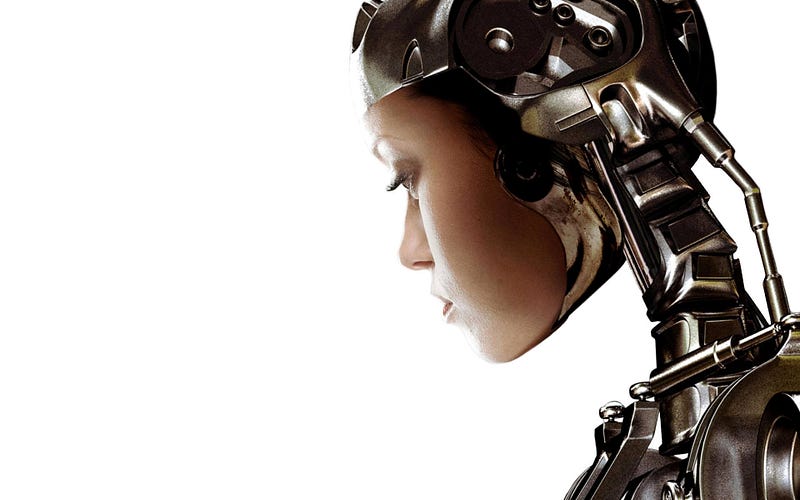
One day a farmer’s donkey fell into a well. The farmer frantically thought what to do as the animal cried out to be rescued, but could not find a solution. The farmer regretfully concluded that as the donkey was old, and as the well needed to be filled in anyway. He gave up the idea of rescuing the donkey, and would simply fill in the well, donkey and all. Hopefully the poor donkey would not suffer too much, he told himself.
Before long the farmer, helped by his neighbours began to shovel earth quickly into the well. When the donkey realised what was happening he wailed and struggled, but then, to everyone’s relief, the noise stopped.
After a while the farmer looked down into the well and was astonished by what he saw. The donkey was still alive, and progressing towards the top of the well. The donkey had discovered that by shaking off the dirt instead of letting it cover him, he could keep stepping on top of the earth as the level rose. Soon the donkey was able to step up over the edge of the well, and he happily trotted off.
Life tends to shovel dirt on top of each of us from time to time. The trick is to shake it off and take a step up.
War of the Roses

The fable of the donkey is relevant today as it portrays the plight of the dyslexic.
These gifted people are subjected to an education system which does not allow for their gifts. Some dyslexics can shake off the dirt heaped upon them and endure the system until the day they are liberated to blossom fully.
Some manage to blossom, whether that be through early detection and subsequent intervention or mentorship, parenting or some other method that helps them hold their head high while they struggle with an education system which has historically measured everyone by the same standard.
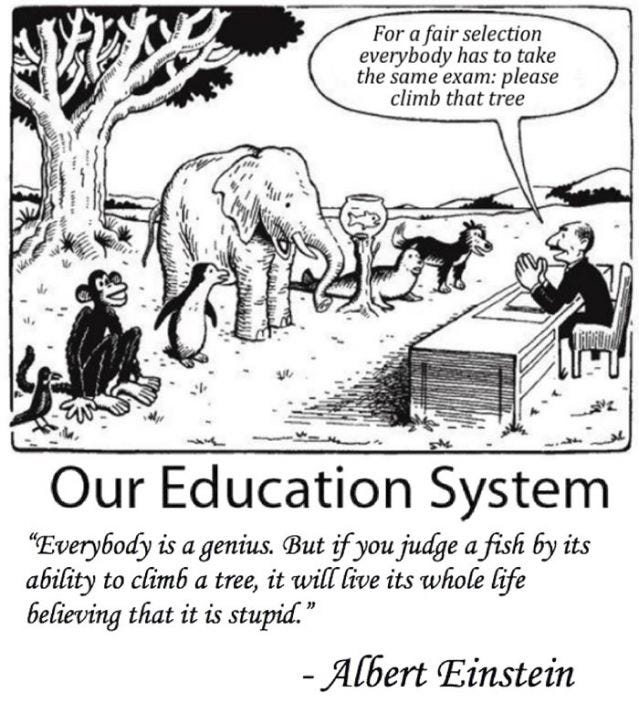
Different “Points of Shoe”

Two shoe salesmen travel to a third world country in search of new sales.
One man calls his boss saying, “I’m coming back. There’s no hope here. Nobody here is wearing shoes”.
The second calls and says, “You wouldn’t believe what I found here. There is so much opportunity. Nobody here is wearing shoes!”
Historically, dyslexia has been seen as a disability, as the glass half empty. Dyslexics have been the victims of ridicule, bullying, abuse and ignorance all their lives. Society has been programmed to see dyslexia as a bad thing. The dyslexic has been programmed to think they are in some way defected and not gifted.
Imagine you are happily playing in pre-school, you are able to take part in every school activity, there is no-one judging you. Then, you move up to the next grade and all of a sudden you discover everyone else can read better and write better.
Your brain needs to work so much harder than everyone else and every time you think you have it (and so do your parents and teacher) you discover you don’t. It is exhausting.
It is not laziness, it is not a lack of desire, your brain simply does not work that way. At best you will learn to compensate.
As time goes on and others adapt to the (archaic) methods of school measurement as you fall further and further behind. You are subjected to the parent teacher meeting, in which your teacher says you need to try harder, but your parents just don’t understand you. You are so smart at other things, so perceptive, so creative, but you can’t read or write well and (maybe can’t do maths either = dyscalculia).
The dirt gets heaped upon you as you are buried in the well, you can’t shake it off as you can’t see a way out of this. If you are disadvantaged and come from a poor area there is even more dirt heaped on you and the well is even deeper.
You join a gang, you find that no one judges you on your reading or writing here, you belong here, you fit in.
But wait, what if there was a different path?
What if you were diagnosed early?
Your teachers would now know you have dyslexia, you will (hopefully) have extra lessons, you will have adapted examinations. You will sit oral exams and you will have someone write for you (in the near future I am sure this will be done by ai).
Your parents will understand you, empathise with you and not get frustrated. You will be exposed to different types of learning than the rest of the school.
In time, you will realise that you think different and this is an amazing gift, your thought process is essential in the new world.
The problem of perception is that both the dyslexic and society need to reframe dyslexia. If I were a dyslexic writing this it would be perceived differently than it may be that I do not have dyslexia.
As a society, we need to reframe dyslexia. Before we look at the gifts let’s look at the locked versus unlocked potential thanks to Dean Bragonier, the founder of NoticeAbility — a nonprofit changing the world for students with dyslexia.

Locked Versus Unlocked Potential
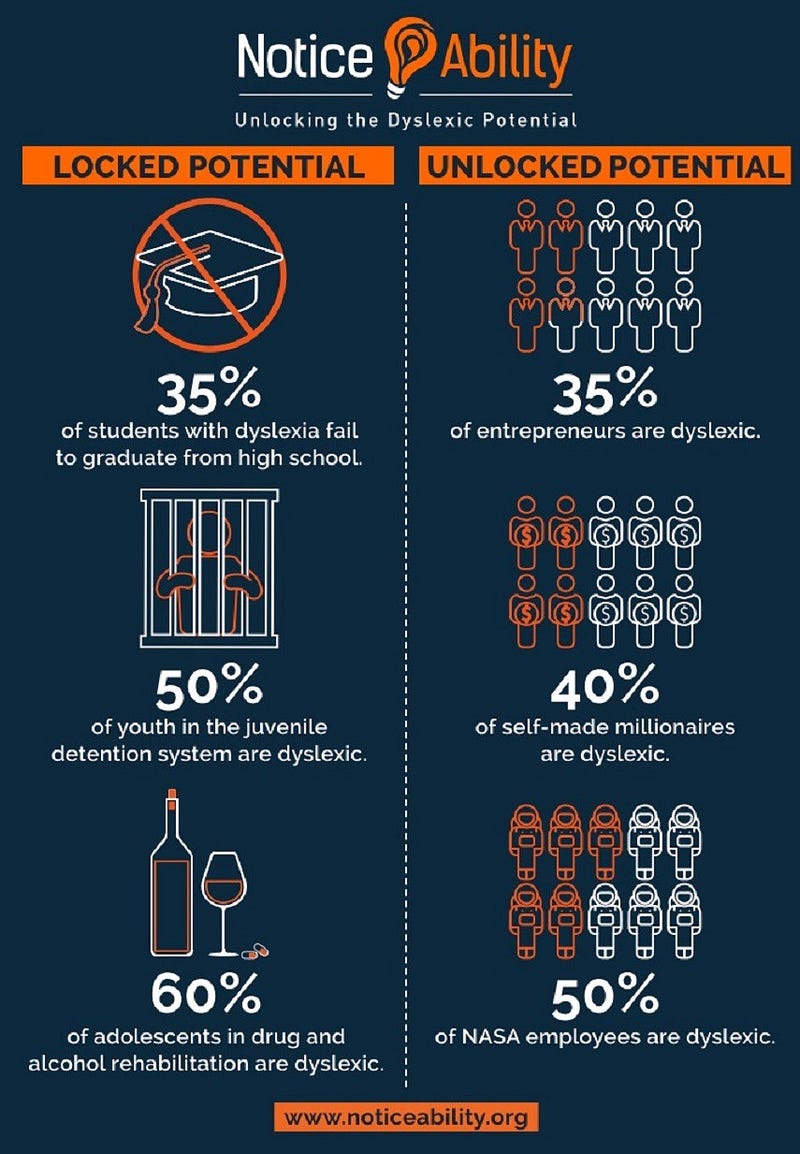
To bring this home to Ireland, Dr. Pauline Cogan tells us on the innovation show that 97% of inmates in Mountjoy Prison (Dublin, Ireland) have learning difficulties. Pauline believes up to 64% have dyslexia.
We have known for a long time that early identification is hugely important, Pauline tells us a child loses 15% of their ability for every year they are NOT identified from their 2nd year in kindergarten.
This is why we need to liberate dyslexics and detect dyslexia very early. Test2r can do this.
Dyslexia: The Gift
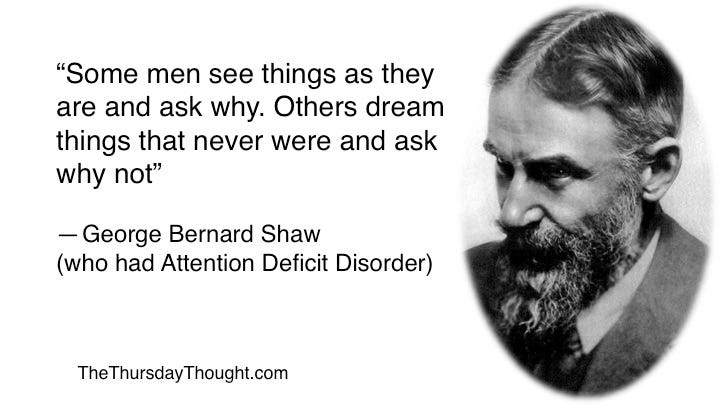
The dyslexic asks Why Not?
About 20% of people are dyslexic.
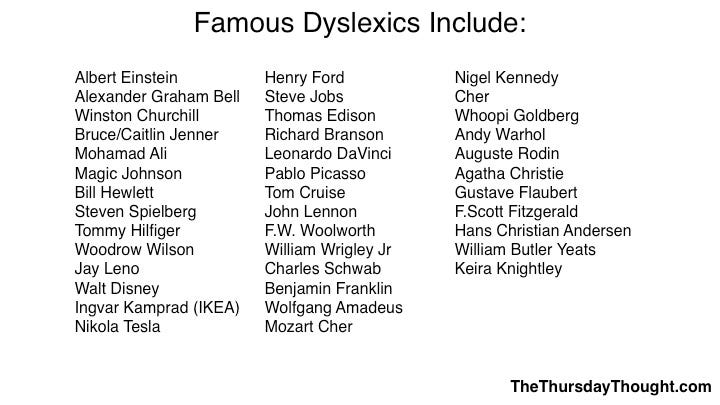
Dyslexics see the world differently because their brains work differently.
Dyslexic process information differently. They see pictures, not words (and words as pictures), this is why phonetic learning for a dyslexic is so punishing. In a non-dyslexic brain the left side is bigger, the left side processes language. In dyslexic brain is the same size as the left side, this is because they use it more. This only enhances the gift.
Dyslexic thinking has many advantages. Dr. Cogan tells us that most of us learn like an “inchworm” we learn sequentially. However, the dyslexic is a “butterfly” and learns by seeing the big picture and figuring out how to dissect it and recreate it.
Dyslexic thoughts are like 3d movies in their heads, they see things as if they are really happening, they have extremely vivid imaginations. A dyslexic reader will often skip words in a sentence but still deliver the sentence with a few words omitted or even added in. This is where big picture thinking comes in, dyslexics are great at “joining the dots”.
Dyslexics have great perseverance, they persevered through school, they made it through, they navigated the system and they hustled.
Dyslexics delegate well, they have to. For years they had to find coping methods. Even in the workplace dyslexics will delegate tasks like note taking, follow up emails etc. This is a gift that is essential as an entrepreneur.
They master skills faster than a non-dyslexic. Once they like a subject or find a subject, hobby or method that they like, they must be left lone. Once interested the dyslexic will master the skill very quickly. Pauline tells us of a child she knows who learned the Moonlight Sonata in 4 months using YouTube.
We need to ensure that more dyslexics shake off the soil, because we need them to step up out of the well, there is a revolution coming and we need them to shine.
Ai Rising
Ever since we discovered that the left side of the brain is responsible for more analytical tasks, it has been viewed as being of greater importance than the right side.
A couple of weeks ago on the Innovation Show Seth Godin told us that the industrial revolution drilled us into a mindset where we no longer independent thinkers. People were (and still are) rewarded for being worker bees staying within the lines and doing as they are told.
In a world where artificial intelligence is replacing jobs that are essentially rote, repeatable tasks, the old model is now broken.
We are on the verge of a dyslex.Ai revolution in the modern workplace, and things are about to look very different.
Ai is getting smart enough now to take over traditionally left brain tasks, tasks that the dyslexic has typically failed at. This levels the playing field for the dyslexic. In that world, the dyslexic can outsource tasks to Ai and focus on their strengths, which include, asking different questions, challenging the status quo and seeing connections that a linear mind can not see.
Computer technology has been taking over human jobs for the last 3 decades, this is not happening all of a sudden, but the rate or change will increase.
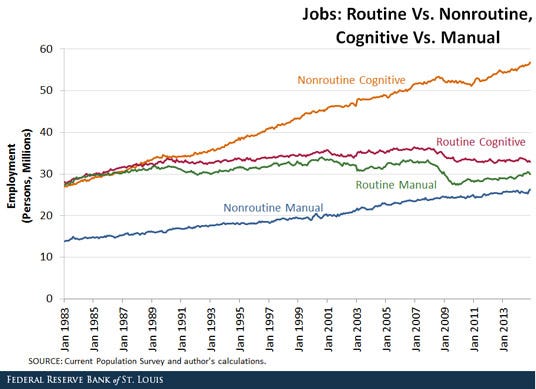
The chart key is as follows (the chart comes from here)
- Nonroutine cognitive occupations, which include management and professional occupations
- Nonroutine manual occupations, which include service occupations related to assisting or caring for others
- Routine cognitive, which include sales and office occupations
- Routine manual, which include construction, transportation, production and repair occupations
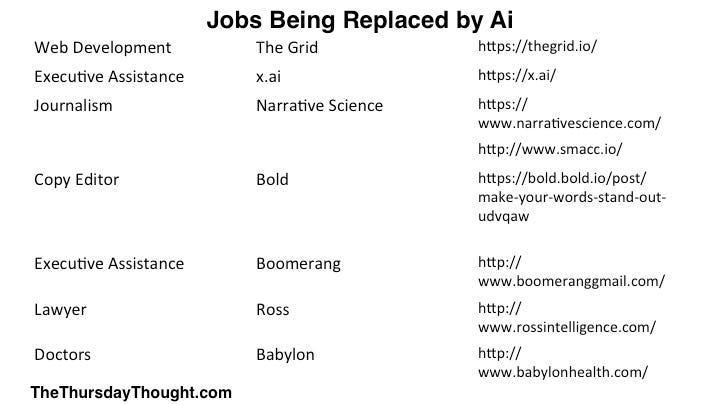
The Right Questions
Seth Godin told us that anything worth “remembering” is now google-able.
CEO of x.ai Dennis Mortensen told us that it is no longer about software assisting you, it is about handing over the task to the software. The “outlier”, the successful person will ask different questions. Coming up with the answer is the easy part (tactics) tomorrow you will be rewarded for coming up with the question (pre-strategy).
“Coming up with the answer is the easy part. Tomorrow, you will be rewarded for coming up with the question. — Dennis Mortensen, CEO of x.ai”
The dyslexic will thrive in this new world. The dyslexic is not only a dreamer, the dyslexic is a visionary. It is the age of the dyslexic. We need to celebrate these gifted people as our world needs these people to move to the next level.
For this to happen we need not to pile the soil on top of the dyslexic, but to cultivate the soil around them.
Cultivating the Soil

Farmers do not grow crops, they prepare the soil for the crops to grow.
Crops flourish when they are nurtured and the soil consistently cultivated.
It is said that great CEOs and innovators do the same, they create the conditions for growth to occur.
This is no different for our children. Those who can afford to give their children opportunities to flourish are truly privileged.
For children with dyslexia, who are born into disadvantaged homes, it is less likely that the learning disability will be detected. They will be at risk of falling behind and to come back to our donkey in the well fable, they are less likely to be able to shake off the soil.
Early detection is key before children are programmed to think they have a problem rather than a gift. Intervention to ensure they feel part of a privileged group of innovators is key before they discover belonging in gangs or crime.
We as a society need to recognise their strengths. It is fantastic to have tools like test2r and organisations like noticeability.org providing tools to the adults who support them.
When dyslexia is recognised in a child and thus testing adapted, dyslexics score significantly higher when they are given additional time and given tests orally. Consistent, multi-sensory, and emotionally reinforcing information is key for learning for a dyslexic.
All this can be enabled when dyslexia is recognised, that is the first step.
Another step lies with those who do not have dyslexia to recognise it as a gift.
— — — — — — — — — — — — — — — — — — — — — — — — — — — — — — — — — — — — — — — — — — — — — — — — — — — — -
On this weeks show we talk to Serial Entrepreneur Dennis Mortensen. We have a refreshingly honest chat about x.ai, about his mindset and about the future.
Dr. Pauline Cogan discusses how dyslexic minds work, gives us some tips on spotting signs of dyslexia and discuss her mission and passion to make a difference with test2r.